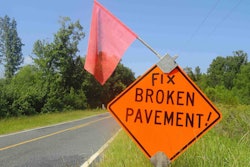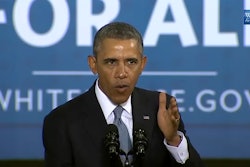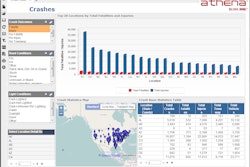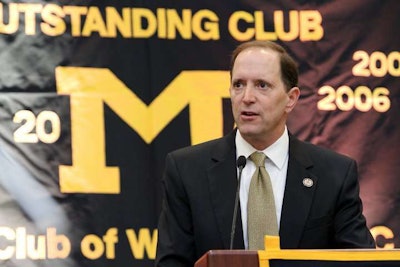 Rep. Dave Camp
Rep. Dave CampCongress got serious Thursday about patching the hole in the Highway Trust Fund, but some differences between the versions drafted by the House and Senate tax-writing committees suggest a standoff that could outlast the dwindling balance in the road-building bank account.
The Department of Transportation has warned state highway departments that without a cash infusion reimbursements could be restricted as of Aug. 1.
And that’s just for the near term. Neither plan tackles the underlying structural weakness in the way the federal government collects and distributes money for surface transportation projects.
On the House side, the Ways and Means Committee held firm to the Republican promise not to raise taxes. Instead, the Highway and Transportation Funding Act of 2014 (HR 5021) would raise $11 billion from existing revenue sources: adjusted pension contributions, extended customs fees and a draw from a trust fund for leaking storage tanks.
The bill, authored by Chairman Dave Camp, would keep the trust fund balance above water through next May – taking the pressure off of Congress to come back after the November elections to deal with a multi-year transportation reauthorization in a lame duck session.
“What troubles me most about a Dec. 31 date are those using it as a ploy to stick the American people with a massive increase in the gas tax – just about the worst tax increase Congress could hit hardworking Americans with,” Camp said in a statement. “So, I am seeking the reasonable middle ground of the end of May 2015.”
In the Senate, a Finance Committee bill from Chairman Ron Wyden and Ranking Member Orrin Hatch also tapped the sources in the House plan, though the pension provision was greatly reduced in the draft and replaced with stricter enforcement of certain elements of the tax code.
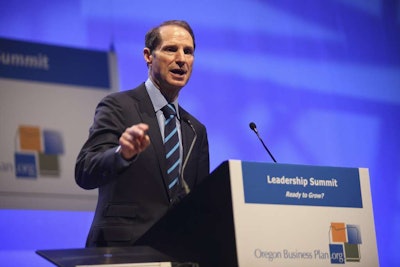 Sen. Ron Wyden
Sen. Ron Wyden“Allowing the Highway Trust Fund to go insolvent next month, clogging the roads Americans use every day and costing us hundreds of thousands of jobs, would be legislative malpractice and I’m not willing to let that happen,” Wyden said.
The Senate committee’s proposal initially did not include the May timeline, and some Republicans interpreted the early version as leading to higher taxes and increased IRS authority, prompting compromise.
“Today’s proposal is a balanced and viable bill that addresses the immediate needs of the highway trust fund,” Hatch said. “And while I had hoped our counterparts on the other side of the aisle would accept cuts to wasteful and low-priority spending as a way to pay for the bill, our proposal is nonetheless a bipartisan product forged by compromise.”
A summary of the Wyden-Hatch Modification bill can be found here.
Critics, however, have downplayed both proposals because they drift away from the “user-pay” principle of the trust fund (which is supported by gas and diesel taxes at the pump, as well as taxes on truck equipment) and because they borrow from future revenues to pay for an immediate fix.
The American Trucking Associations contends that the deterioration in the U.S. infrastructure is the result of an “inadequate, inconsistent and unpredictable funding cycle” that is perpetuated by putting off a long-term bill.
“Our industry pays $18 billion each year into the federal Highway Trust Fund through taxes and fees – more than 40 percent of total highway user fee – because the highway system is the trucking industry’s workplace,” ATA President and CEO Bill Graves said in a statement. “Companies that fail to maintain and modernize their plants and equipment inevitably fail. The highway system is no different.”
ATA has long sought an increase in highway user fees, and has advocated for an increase in the fuel tax.
While giving Congress credit for moving forward with short-term solutions, Graves said that “extending the funding problem well into 2015 could endanger the nation’s economy, the future of the trucking industry and, most importantly, the safety of truck drivers and other highway users.”



